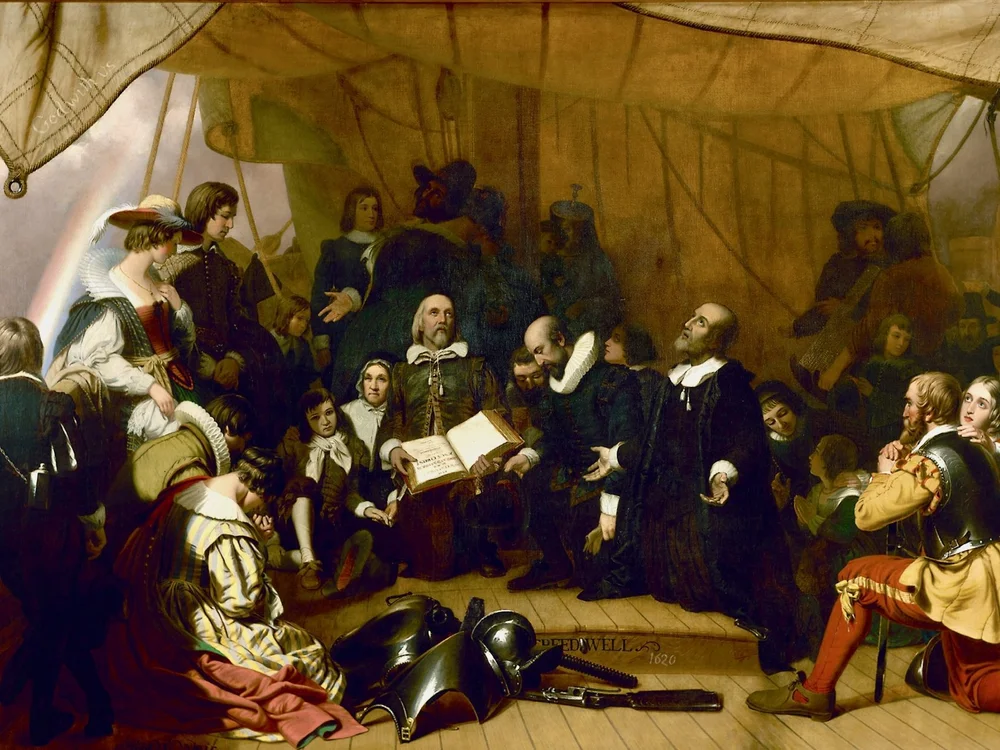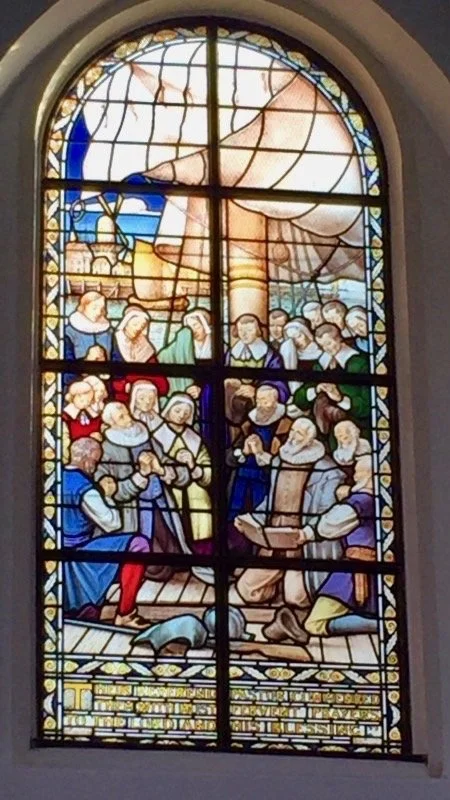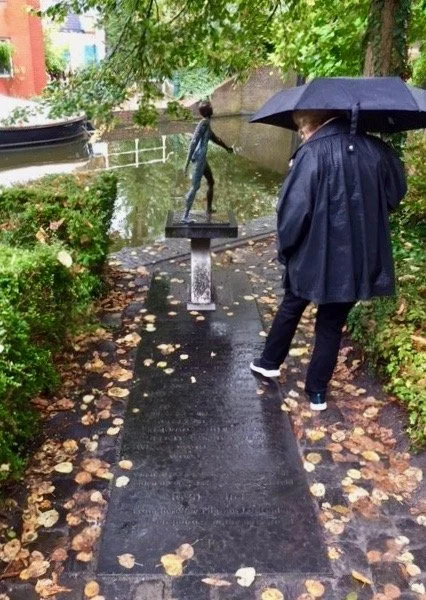
Image from Wikimedia Commons; Robert W. Weir (photograph courtesy Architect of the Capitol)
Disclosure: This post may contain affiliate links, meaning Beautiful Christian Life LLC may get a commission if you decide to make a purchase through its links, at no cost to you.
We all love a great meal. Families and friends joined together around the table. The tastes of well-prepared food and drink. Being together and thankfully celebrating the blessings we enjoy by the providence of God. With colorful fall leaves and children drawing pictures of the Pilgrims who landed in New England in 1620, the American celebration of the Thanksgiving holiday is often people’s favorite meal of the year.
But what of the Pilgrims? Over four hundred years ago, the small group of English Puritan dissenters left their homes in Leiden, Holland, for America. Most Americans are generally familiar with the difficulty of their voyage across the Atlantic Ocean, their arrival, and their terrible first winter in the wilderness of Massachusetts (by spring, half of them were dead). Why the Pilgrims left the comforts of Leiden for the uncertainties of the American wilderness is less well known. William Bradford, their leader and first governor of Plymouth Plantation provided the reasons in Bradford’s Of Plymouth Plantation (printed by Wright & Potter, Boston, 1899), which he originally wrote in his own hand.[1]
Leaving England for Holland
The reasons the Pilgrims left Leiden in 1620 after having lived there for twelve years are enlightening. The small band of Christians had fled from England to Holland in 1608 because they had continued to suffer increasing persecution. Bradford, after describing the previous persecutions of the church since the first breaking out of the light of the gospel in England, wrote of how the Pilgrims struggled to endure greater afflictions and molestations in the early seventeenth century:
But after these things they could not long continue in any peaceable condition, but were hunted & persecuted on every side, so as their former afflictions were but as flea-bitings in comparison of these which now came upon them. (p. 14)
Experiencing the “diligence & malice of their adversaries,” (p. 15) they resolved to flee to Holland, and after a short time in Amsterdam they settled in Leiden where they lived and worshipped in relative peace.

The window in the church (established in 1607) where the Pilgrims worshipped in Amsterdam in 1609.
But why leave Leiden? Why leave comfortable homes, food, and church for the risks of a transatlantic voyage and the uncertainties of trying to live in a wilderness? Bradford gives four reasons:
1. The Hardness of Life in Holland
First, Bradford describes the hardness of the place—the discouragements of the “great labor and hard fare, with other inconveniences which they underwent & were contented with” (p. 30). Even though other dissenters in England chose to endure prison there, the Pilgrims chose to bear the difficulties of life in Holland in order to enjoy the “ordinances of God in their puritie, and the libertie of the gospell with them” (p. 30). Yet, sensing dangers in their present conditions, they began to consider the possibility of moving to another place.
2. Danger of Scattering
Second, they believed they were in danger of scattering (p. 31). While they generally bore their difficulties cheerfully and with courage, they were concerned that in growing older they would be less able to sustain the hard labor required of them in Holland. The result would be that many would be tempted to leave. The group began to think it better to move to a more advantageous and, if possible, a less dangerous place.

The location from where the Pilgrims embarked in Leiden.
3. Concern for Their Children
Third, the parents feared their children would be in danger of becoming degenerated and corrupted. Specifically, Bradford described the laments and sorrows…
…most heavie to be borne was that many of their children, by these occasions, and the great licentiousness of youth in the countrie, and the manifold temptations of the place, were drawn away by evill examples into extravagante & dangerous courses, getting the raines off their neks, & departing from their parents. (p. 32)
4. Advancing the Kingdom of Christ
Fourth, the pilgrims hoped to advance the gospel:
(and which was not least,) a great hope & inward zeall for laying some good foundation, or at least to make some way thereunto, for the propagating & advancing the gospell of the kingdom of Christ in those remote parts of the world; yea, though they should be but even as stepping-stones unto others for the performing of so great a work. (p. 32)
A Day of Thanksgiving
These are the four reasons Bradford wrote by his own hand to explain why the Pilgrims decided to leave Holland for America. Looking to the future as they grew older in a hard land and with concern for the continuation of their group and an opportunity for bringing the gospel and advancing the kingdom of Christ in a new part of the world, the Pilgrims resolved to leave Leiden for America. They arrived at Cape Cod on November 11, 1620 (p. 97), and for nearly three years struggled to survive.
In 1623, after no rain from May through the middle of July, their crops languished and withered; another year looked bleak. They set aside a day of “humiliation” for fervent prayer. After the time of prayer Bradford described the rain:
…toward evening it began to overcast, and shortly after to raine, which shuch sweete and gentle showers, as gave them cause of rejoyceing, & blesing God. It came, without either wind, or thunder, or any violence, and by degreese in the abundance, as that the earth was thorowly wete and soked therewith. Which did so apparently revive & quicken the decayed corne & other fruites, as was wondefull to see, and made the Indeans astonished to behold; and afterwards the Lord sent them shuch seasonalble showers, with enterchange of faire warme weather, as, through his blessing, caused a fruitfull & liberall harvest, to their no small comforte and rejoyicing. For which mercie (in time conveniente) they also sett aparte a day of thanksgiveing. (p. 171)
Little did they know that half would die by the end of the first winter in 1621. Yet, by God’s grace they persevered, and by God’s providence they built homes, planted gardens, worked, married, and had children. And with the help of a native named Squanto (p. 121) and rains sent by God, they enjoyed the fruitfulness of their labors. Rooted firmly by faith in Christ Jesus, they gave thanks for God’s blessings and enjoyed a time of celebration—a meal of good and plentiful food, and the fellowship of family and friends.
This article has been updated since its original publishing date of November 20, 2018.
Related Articles:
-
10 Beautiful Things You Will Be After Reading Church History
-
4 Reasons Why Every Christian Needs a Deeply Historical Faith
-
Christian Basics: What Are the Five “Alones” and Why Do You Need to Know Them?
Note:
[1] Quotations are from William Bradford, Bradford’s History of “Plimoth Plantation” From the Original Manuscript (Boston: Wright & Potter Printing Co., 1899).
from Blog - Beautiful Christian Life https://ift.tt/IGOrvSg
via IFTTT

No comments:
Post a Comment